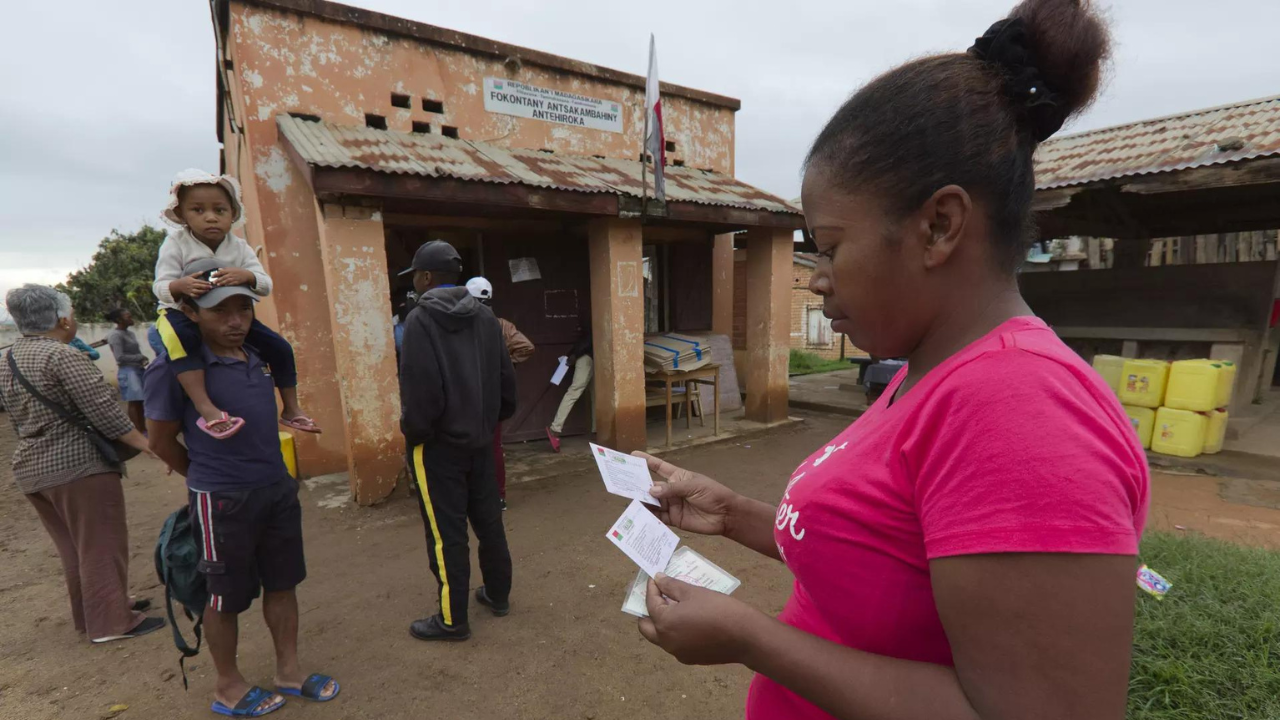[ad_1]
ANTANANARIVO: Madagascar president Andry Rajoelina has won re-election in the first round of a ballot boycotted by nearly all opposition candidates in the Indian Ocean island nation, the election commission said Saturday.
Rajoelina won 58.95 percent of the votes cast in the November 16 presidential election, according to the results presented by the poll body which need to be validated by the Constitutional Court.
Turnout was just over 46 percent, down on the previous presidential election in 2018, which the election commission blamed on “ambient political climate” and “manipulation of opinion”.
“The Malagasy people have chosen the path of continuity and stability”, the 49-year-old Rajoelina said after the results were announced.
Rajoelina first came to power in 2009 following a mutiny that ousted former president Marc Ravalomanana. He then skipped the following elections only to make a winning comeback in 2018.
The 11 million voters had to choose between Rajeolina and 12 other candidates. Ten of the incumbent’s rivals refused to campaign and urged voters to shun the ballot, branding it a farce.
Rajoelina, a former mayor of the capital Antananarivo, is accused by rivals of corruption, greed, and turning a blind eye to the pillage of the country’s natural resources, including its precious rosewood forests.
“What results? What election?” was the joint opposition response to a request for comment on Rajeolina’s victory.
“We will not recognise the results of this illegitimate election, riddled with irregularities, and we decline all responsibility for the political and social instability that could ensue”, the opponents warned.
‘Worrying anomalies’
The opposition has not yet indicated if it will formally contest the result and has not called for more street demonstrations.
In the weeks leading up to the vote, the opposition — including two former presidents — led near-daily, largely unauthorised protests that were regularly dispersed by police using tear gas.
Madagascar has been in turmoil since media reports in June revealed Rajoelina had acquired French nationality in 2014.
Under local law, the president should have lost his Madagascan nationality, and with it, the ability to lead the country, his opponents said.
Opposition candidates complained of an “institutional coup” in favour of the incumbent, accusing government of working to reappoint Rajoelina.
They called for the electoral process to be suspended and for the international community to intervene.
Eight countries and organisations including the European Union and the United States expressed concern about the “disproportionate use of force” to disperse opposition demonstrations.
The opposition has denounced irregularities, including closed polling stations, a lack of ballot boxes and the use of state resources by Rajoelina for his campaign.
One of the two opponents who formally remained in the race, Siteny Randrianasoloniaiko, also denounced “worrying anomalies” which he said “raise legitimate questions about the validity of the results”.
The election took place “in regular and transparent conditions”, Arsene Dama, the president of the national electoral commission, said on Saturday.
Dama’s impartiality has been questioned by the opposition.
Rajoelina won 58.95 percent of the votes cast in the November 16 presidential election, according to the results presented by the poll body which need to be validated by the Constitutional Court.
Turnout was just over 46 percent, down on the previous presidential election in 2018, which the election commission blamed on “ambient political climate” and “manipulation of opinion”.
“The Malagasy people have chosen the path of continuity and stability”, the 49-year-old Rajoelina said after the results were announced.
Rajoelina first came to power in 2009 following a mutiny that ousted former president Marc Ravalomanana. He then skipped the following elections only to make a winning comeback in 2018.
The 11 million voters had to choose between Rajeolina and 12 other candidates. Ten of the incumbent’s rivals refused to campaign and urged voters to shun the ballot, branding it a farce.
Rajoelina, a former mayor of the capital Antananarivo, is accused by rivals of corruption, greed, and turning a blind eye to the pillage of the country’s natural resources, including its precious rosewood forests.
“What results? What election?” was the joint opposition response to a request for comment on Rajeolina’s victory.
“We will not recognise the results of this illegitimate election, riddled with irregularities, and we decline all responsibility for the political and social instability that could ensue”, the opponents warned.
‘Worrying anomalies’
The opposition has not yet indicated if it will formally contest the result and has not called for more street demonstrations.
In the weeks leading up to the vote, the opposition — including two former presidents — led near-daily, largely unauthorised protests that were regularly dispersed by police using tear gas.
Madagascar has been in turmoil since media reports in June revealed Rajoelina had acquired French nationality in 2014.
Under local law, the president should have lost his Madagascan nationality, and with it, the ability to lead the country, his opponents said.
Opposition candidates complained of an “institutional coup” in favour of the incumbent, accusing government of working to reappoint Rajoelina.
They called for the electoral process to be suspended and for the international community to intervene.
Eight countries and organisations including the European Union and the United States expressed concern about the “disproportionate use of force” to disperse opposition demonstrations.
The opposition has denounced irregularities, including closed polling stations, a lack of ballot boxes and the use of state resources by Rajoelina for his campaign.
One of the two opponents who formally remained in the race, Siteny Randrianasoloniaiko, also denounced “worrying anomalies” which he said “raise legitimate questions about the validity of the results”.
The election took place “in regular and transparent conditions”, Arsene Dama, the president of the national electoral commission, said on Saturday.
Dama’s impartiality has been questioned by the opposition.
[ad_2]
Source link


